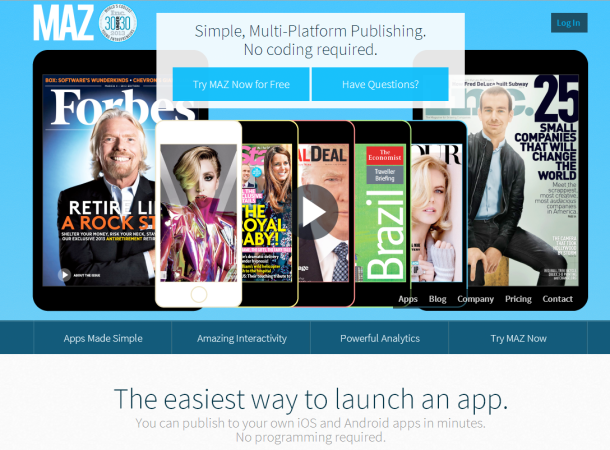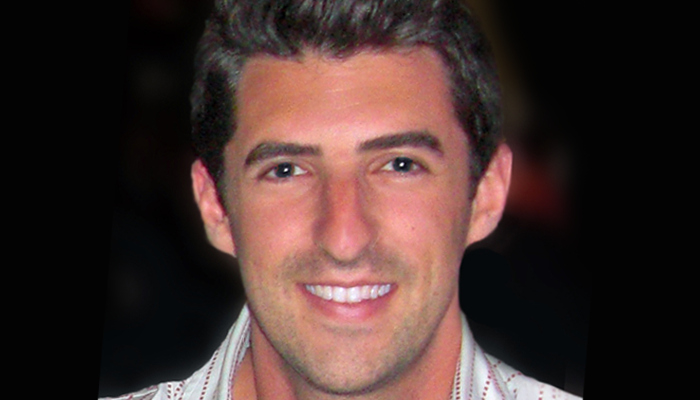Paul Canetti is the founder and CEO of MAZ, a publishing platform for mobile and tablet devices. A skilled UX/UI designer who previously worked at Apple and Condé Nast, Paul founded MAZ in 2010 to combine his love of media and technology. Recently listed as one of Inc.’s 30 Under 30 Young Entrepreneurs, he also teaches regularly at New York’s General Assembly about topics such as UX, apps, advertising, and startups.
Q: Please tell us a little bit about your company – what is Maz all about?
MAZ is a publishing platform that helps people create and distribute content to mobile and tablet devices. We work with media companies like Forbes, Inc. Magazine, The Economist, and Star Magazine, as well as medical and legal journals, and a variety of other content creators to produce and distribute to iPad, iPhone, Android tablets and smartphones, and Amazon Kindle Fire. The idea is simple: if you use MAZ to publish, then you can concentrate on actually creating instead of worrying about the technical stuff. We work really hard to make sure the process is as simple and as seamless as possible for our customers, so that they can keep doing what they do best, which is publishing quality content.
Q: Please tell us a little bit about your background and how you started your company?
My career started in the print magazine design world, and so there is a natural extension to what we are doing at MAZ. I also did web design in the late 90s and early 00s, and was really into digital design as a teenager. I worked at Apple starting in 2006, one year before the first iPhone debuted. Being at Apple during that period of time was truly amazing. The world was changing so rapidly, and we were right in the middle of it. (I got my first white hair the week the iPhone launched!)
I left Apple in 2009 and was doing consulting and freelance iPhone app design. When the iPad came out in early 2010, there was an immediate need in the publishing industry for apps, and that is when the idea of MAZ was born. In a lot of ways, MAZ was originally designed to make our freelancing more efficient. From there it grew and grew into the comprehensive platform that it is today.
Q: What are some of the projects you are working on right now?
We are always working on new things– updates to the platform, new designs, new features, and so on. Currently I am spending a lot of energy on exploring how people share content on mobile and tablet devices. We have a great tool called Clippings that allows anyone to “cut out” something from the digital page and then share it across social media, email, or save it for later. I want to take Clippings even further by understanding why and how people share while reading online. Some of our innovation comes out of customer demand, and some comes out of our own anticipation of what will be important in the future. You have to have the right balance.
Q: What are your plans for the future, how do you plan to grow this company?
The biggest barrier we have is that not everyone knows that MAZ exists, and so marketing and sales is a big area of focus for us going into 2014. When you build a software company, at the beginning the priority must be the software itself. If your product is sub-par, then it doesn’t matter if you have marketing/sales power, because what you are selling will be garbage, and no one wants to buy garbage. So we have spent the last three years making our product as good as it can possibly be. And while that effort is certainly an ongoing one, we now have the resources and the history to start to distribute our efforts across multiple areas of the business, and sales/marketing is a big one for us. Startups talk about many different metrics, but for enterprise software, nothing talks louder than revenue, so sales is vital.
Q: What are the top 3 mistakes you made starting your business, and what did you learn from it?
There have been so many mistakes; it’s hard to even pick three! But I’ll try (in no particular order):
(1.) Make sure you have agreements in place with founders, employees, contractors, advisers, even very early on! No one ever thinks it is necessary at the beginning, but it really is. When you need those docs, and don’t have them, it is not fun. So suck it up and get those agreements in place.
(2.) Don’t spend a lot of legal fees. We blew our first $30k on a big fancy law firm to draft up our Terms of Service and Privacy Policy. They are very good quality docs, but they were overkill at the time, and we could have used that cash in so many other ways. Treat legal just like every other part of your business and stay scrappy!
(3.) It’s okay to say no. There were so many times when we would bend our will to please people in one-off scenarios, but ultimately we took time and energy away from our main focus. You need to be flexible of course, but it’s also okay to put the blinders on and just push forward, even if it means saying no to people. It’s a mistake I still make way to often: you cannot please everyone!

Q: Please share some advice for newbie tech entrepreneurs, someone who’s just starting out.
Don’t worry about anything except your product. I cannot say it enough, just work on your product, all the time. Don’t get ahead of yourself and plan out all this other crazy stuff unless your product is already perfect. Ideas are worth nothing. Plans are worth nothing. Your product is everything.
If you are not capable of building a great product (i.e. you do not design or code), then get co-founders that are and work together to make your vision into a reality. For me, I am a designer, but I partnered with two incredible developers, my co-founders, Simon Baumer and Shikha Arora, in order to build MAZ.
Product product product product product product. That’s all you should be thinking about.
Q: What was the best business advice you have ever received and who gave you this advice?
The best advice I’ve ever been given is something that has been said to me many times by many different people, but it took a long time for it to start to stick. “Think bigger.” Just take those words to heart. Whatever you have your mind, it is not big enough. And if you have already limited yourself in imagining what is possible, then imagine everyone else like your employees, investors, advisers, customers, etc. think about the company. You will always be the most extreme end of the spectrum, so make sure you are maxed out on big-ness. You have to aim for the stars and then pass on that grand vision down the line to everyone around you. When you think you’ve finally got a big enough vision, go back and think of something even bigger.
Q: What are the top 3 online tools and resources you’re currently using to grow your company?
A big piece of growing is keeping tabs on the industry from all angles. I really like Jason Hirschhorn’s Media ReDefined daily newsletter, I get a lot of my tech and media news from there.
I also am an avid read of Daring Fireball for all things Apple. John Gruber’s POV is interesting, but it’s also just a really nice round-up of Apple-related news.
I also like to read science journals, things totally unrelated to my work, to get me out of my own head. When you read about what the worlds’ most advanced scientists are doing, it makes your own projects seem much more attainable by comparison.
Q: What’s your definition of success?
Success means different things at different stages, but for me, there is one consistent metric. If I wake up every morning excited about what I’m doing, continue to learn, and continue to create new things that contribute to the world, then that is success for me. What happens tomorrow no one knows, but if I can feel proud of the work I do today, then that is success in my eyes.
Q: What are some books you recommend entrepreneurs to read?
Instead of reading books about building something, my suggestion is to go build something.
Q: What is your favorite entrepreneurship quote?
“Life can be much broader once you discover one simple fact: Everything around you that you call life was made up by people that were no smarter than you. And you can change it, you can influence it, you can build your own things that other people can use. Once you learn that, you’ll never be the same again.”
– Steve Jobs
Q: How can our community get in touch with you?
Best way to reach me is on Twitter – @paulcanetti . Also check out my blog at paulthewizard.com and of course MAZ’s site mazdigital.com








